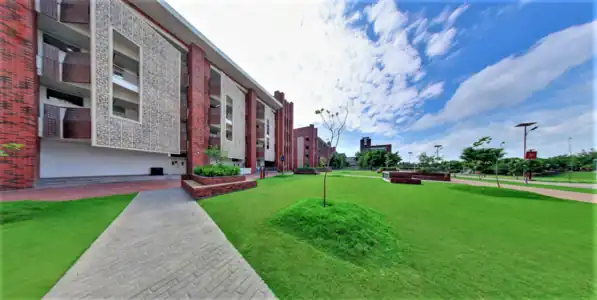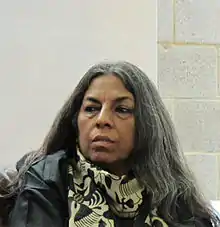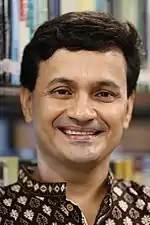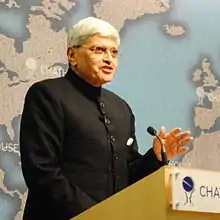Ashoka University
Ashoka University is a private research university located in Sonipat, India, providing a liberal education in the humanities, the social sciences, and natural sciences.[2][3]
 | |
| Type | Private research university |
|---|---|
| Established | 2014 |
| Chancellor | Rudrangshu Mukherjee |
| Vice-Chancellor | Somak Raychaudhury |
Academic staff | 200 |
| Students | 4,500 |
| Location | , , India |
| Campus | 25 acres (10 ha) |
| Colours | Red & Blue |
| Affiliations | UGC, ACU[1] |
History
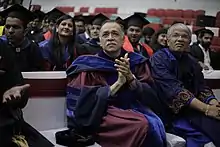
The institution was named after the Mauryan emperor Ashoka.[4] It was conceived as an idea after Sanjeev Bikhchandani and Ashish Dhawan approached Pramath Raj Sinha, a former dean of the Indian School of Business, for his assistance in setting up the university. The project was code-named Project Nobel,[5] referring to the founders' aspiration to produce future Nobel Prize laureates.[6]
Initial discussions aimed to set up an institute of engineering and technology that could match the reputation of leading institutions in the field, such as MIT, the University of Pennsylvania and Stanford University. Ashoka's founders signed a memorandum of understanding with the University of Pennsylvania School of Engineering and Applied Science. The founders' list named 22 people, including Ashok Trivedi, Dilip Shanghvi, Nirmal Jain, Sanjeev Bikhchandani and Jerry Rao.[7][4] The list later grew to 46.
Ashoka expanded its focus to providing an education in the liberal arts, combining instruction in the natural sciences, social sciences, and the humanities.[8][9] The decision was a result of both the industry demand as well as the desire to change the mindset of Indian students and parents.[10] Trivedi fortified this decision by setting up the Trivedi Centre for Political Data (TCPD) in partnership with the University of Michigan.[11] In 2020, Ashoka University established the Trivedi School of Biosciences with virologist Shahid Jameel as the first director of the centre.[12]
Campus
Ashoka University's 25-acre (10 ha) main campus is in the Rajiv Gandhi Education City in Sonipat, Haryana. It was designed by the American design firm Perkins Eastman[13] led by architect Aaron Schwarz.[14] In September 2021, the foundation stone was laid for a new 27-acre campus in Sonipat, expected to be operational by 2027, which will double the university's student capacity.[15]
Governance
Ashoka University is funded entirely by donations, with no hierarchies present in the founding group in terms of decision-making. The founders were drawn to the idea of a university where no single individual held sway but whose administration would be driven by the potential for social change based on critical inquiry, free from political pressure.[16] In addition to the chancellor, vice-chancellor and deans, Ashoka is guided by an academic council of academics and scholars. The council sets the university's academic standard, advising on matters of curriculum, faculty hiring, and research.[17]
The first chancellor was Andre Beteille, who served from 2014.[18] The first vice-chancellor was Rudrangshu Mukherjee.[19] In 2017 Beteille resigned, to be replaced by Mukherjee, and Pratap Bhanu Mehta was appointed vice-chancellor from July 2017.[20] Mehta resigned in July 2019 and was replaced by Malabika Sarkar.[21] Sarkar stepped down on 1 January 2023 and was replaced by Somak Raychaudhury.[22]
Academics
Undergraduate programme
Ashoka University offers a multidisciplinary Undergraduate Programme, in the interest of exposing students to many different perspectives in and out of the classroom. Students are not expected to declare their Major until the middle of the second year. Students enrolled at Ashoka University can choose their Major and Minor from various interdisciplinary options.[23]
Young India Fellowship
The Young India Fellowship (YIF), offered as a Postgraduate Diploma in Liberal Studies, is the signature programme at Ashoka University.[24] The cohort now consists of 100 Fellows who come from diverse academic, professional, socio-economic, and geographical backgrounds. Within a year, they engage with diverse study, research and practice areas. Since 2011, the YIF has had over 1700 participants.[25] Its first graduating class included 57 Fellows, all of whom were provided with a full scholarship.[26] The programme comprises eight terms of six weeks each, with up to four courses in each term. The Fellowship emphasizes writing, research, and experiential learning—in the form of an 8-month part-time Experiential Learning Module.[27] The application for the fellowship has an age restriction and it only allows students with maximum 28 years of age to apply for the program.[28]
Masters programmes
Ashoka University offers graduate programmes in the form of Master's degree and Ph.D. programmes. Right now the master's degree programmes are offered in Economics, English, and Liberal Studies as well as Ashoka Scholars Programme.[29] While a Ph.D. degree is offered in Biology; Chemistry, Computer Sciences; Economics; English; History; Physics; Psychology; Sociology and Anthropology. Other short term programmes offered are the Young Scholars Programme, Summer Programmes and Ashoka X (Ashoka's virtual education initiative).[30]
Ph.D programme
Ashoka University promotes interdisciplinary research and partnerships with industry and policy-makers. Students can register for Ph.D. programmes in Biology, Chemistry, Computer Science, Economics, English, History, Physics, Psychology, Sociology and Anthropology.[31]
Chief Minister's Good Governance Associates (CMGGA) programme
The CMGGA programme is a collaboration between the Government of Haryana and Ashoka University.[32] The associates are trained, after which they are posted in each of the 22 districts of Haryana for 12 months. During their tenure, they represent the Chief Minister's Office and work closely with the Deputy Commissioner and district officials to drive changes at the highest and grassroots levels of the Government.[33]
Admissions
The undergraduate admission procedure includes an application form, an on-spot essay, an interview, and an aptitude objective test. Ashoka University's own admissions test is called the Ashoka Aptitude Test. It also accepts the SAT, one of the first universities in India to do so. [34] Ashoka University is a Founding Member institution of the India Global Higher Education Alliance, which addresses how admissions policies among Indian and non-Indian institutions influence access and equity in higher education.[35]
Reputation
| University rankings | |
|---|---|
| Regional – Overall | |
| QS Asia[36] | 239/686 |
| National – Overall | |
| QS National[37] | 26/116 |
Ashoka University is known for its scholarship in the international community.[38] In 2017, the university was awarded 'University of the Year' (in existence for less than 10 years) and recognised for 'Excellence in Internationalization,' at the 4th Federation of Indian Chambers of Commerce and Industry (FICCI) Higher Education Excellence Awards 2017. In 2019, EducationWorld ranked Ashoka University 2nd in top 100 private universities in India. In September 2020, the Department of Economics[39] was ranked number 1 in India out of 239 Institutions (and 31st in Asia out of 1539 institutions) according to Research Papers in Economics (RePEc) - the international database of economics research which covers 8198 institutions and 60355 registered authors worldwide.[40] Further in 2020, the World Digital Awards 2020 was awarded to Ashoka for Organisational Excellence in Education. The university was also among 12 universities to get E-Learning Excellence for Academic Digitisation (E-LEAD) certification from QS IAUGE. In the same year, the Economics Department of the university ranked at number 1 (#1 of 239 institutions) in India, and in the top 12.5% in Asia (at #31 of 1539 institutions), according to the international database RePEc, which covers 8198 institutions and 60355 registered authors worldwide. In the QS World University Rankings 2022, Ashoka was ranked in the Top 30 universities in India and the Top 250 universities in Asia.[41]
Centres at Ashoka
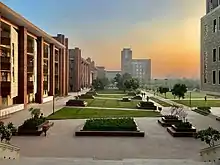
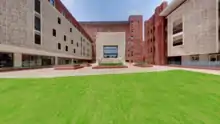
Ashoka University has established several centres to encourage research-oriented collaborations and create an exciting interdisciplinary environment at the university.[42]
- Ashoka Centre for Translation[43]
The Ashoka Centre for Translation (ACT) functions under professors Rita Kothari and Arunava Sinha.[44] The vision of the centre is to foster, nurture, and foreground India's multilingual ethos. The Ashoka Centre for Translation aims to engage in knowledge production and distribution through the vehicle of translation. The Ashoka Centre for Translation does not restrict itself to only English.
- Ashoka Centre for Well-Being[45]
Ashoka Centre for Well-Being (ACWB) was established in 2016 as a one-of-a-kind, non-aligned entity. It provides a safe space where students, staff, as well as faculty members of the university can access free and confidential counselling and psychological support. The Centre consists of professionally qualified queer affirmative counsellors, ushered by Arvinder J Singh, Founder-Director of the centre. The centre also aims to encourage good mental health by devising effective coping mechanisms through skill-building and awareness programmes[46] so that individuals are well-equipped to deal with any turmoil that they face.
- Koita Centre for Digital Health at Ashoka (KCDH-A)[47]
Koita Centre for Digital Health at Ashoka (KCDH-A) is an interdisciplinary Centre, offering robust academic and research programmes aimed at advancing and developing a fresh perspective on Digital Health. Established in August 2023, it focuses on the convergence of healthcare, genomics, information technology, and artificial intelligence revolutions. KCDH-A aspires to nurture a new generation of Digital Health thinkers, innovators, and implementers through a balanced emphasis on education and research. The Centre offers strong academic programmes in digital health & informatics, drive research in next generation digital health tools & solutions and create strong executive education in digital health. KCDH-A is a joint centre of the Trivedi School of Biosciences and the Department of Computer Science at Ashoka University, established with support from Koita Foundation, a philanthropic organisation with a mission to accelerate Digital Health adoption in India.[48]
- Centre for Climate Change and Sustainability[49]
Established in 2020 as the brainchild of the Vice Chancellor Professor Malabika Sarkar, the Centre for Climate Change and Sustainability (3CS) is an interdisciplinary centre that brings together members with a shared interest in studying, communicating, and mitigating the effects of future climate change on our society, health, and environment. The Centre leverages the expertise of 28 faculty members from across 9 departments, including Gautam Menon,[50] Iain Stewart, Srinath Raghvan, Sumana Roy, L.S. Shashidhara among many other notable names. It aims to spread awareness, foster research and advocacy[51] on pertinent issues of climate change and sustainability.
One of the key programs of the centre is the 3CS Media Fellowship.[52] It has been designed to support climate journalism from marginalized members of the society, geographically or otherwise, who are most affected by climate change.
- Centre for Economic Data and Analysis[53]
The Centre for Economic Data and Analysis (CEDA) at Ashoka University is established by the Economics Department with Ashwini Deshpande[54][55] serving as its Director. CEDA works to facilitate informed debate about economic and social developments in India. The centre also generates content in the form of blogs, research papers, policy briefs, and social and economic commentaries[56] among other things. One of the primary aims of CEDA is to make data accessible to the concerned stakeholders. For this purpose, CEDA has created a public data repository[57] along with an interactive visualization toolkit. This is extensively used by researchers, journalists,[58] policymakers, students, and others.
- Centre for Entrepreneurship[59]
Ashoka University has always been proactive in encouraging its entrepreneurial minds. To this end, the InfoEdge Centre for Entrepreneurship with support from the founders and under Priyank Narayan functions as the creative hub that nurtures entrepreneurial endeavors. It has a set of experts who provide relevant mentorship. The center is multidisciplinary in its approach, existing at the cusp of Liberal Arts and Entrepreneurship, the result of which is a community of Entrepreneurs working in a wide range of sectors spanning from the mainstream to the niche sectors. It holds events like Startup Ashoka, Ashoka Pillar Award,[60] AIM Smart City Accelerator among others.
- Centre for Interdisciplinary Archaeological Research[61]
The Centre for Interdisciplinary Archaeological Research (CIAR) at Ashoka University, is the first of its kind in India. The faculty membership is spread across departments with names such as Nayanjot Lahiri, Kritika M. Garg,[62] Shibani Bose, Alok Bhattacharya and Upinder Singh. The Centre aims to bridge the gap between the sciences and archaeology and use that interdisciplinarity to facilitate novel opinions that will deepen the study of the Indian past. This would also aid the Centre in designing course pedagogy and initiate research[63] that utilizes perspectives from both sciences and humanities. To achieve this, the centre has also launched fellowships[64] in ancient and medieval Indian history/archaeology.
- Centre for Social and Behaviour Change[65]
Founded by Ashoka University and supported by the Bill and Melinda Gates Foundation (BMGF), the Centre for Social and Behavior Change (CSBC) drives behavioral change measures for people and communities in need. The center is led by Dr Pavan Mamidi and Dr Sharon Barnhardt. It aims to advance the science and practice of behavior changes, harnessing cross-disciplinary expertise in the areas of nutrition, sanitation, maternal health, family planning, and financial services. In 2019, the NITI Aayog partnered with CSBC and BMGF to institute an embedded Behavioral Insights Unit for India and introduce a novel paradigm of behaviorally-informed policy design and implementation in the country. Since then, CSBC has partnered with the state governments of Uttar Pradesh and Bihar to set up Behavioral Insights Units in UP and Bihar.[66][67]
- Centre for Social Impact and Philanthropy[68]
The Centre for Social Impact and Philanthropy (CSIP) was instituted in 2016, through the efforts of Ingrid Srinath,[69] who serves as the center's Director. It is the country's first academic center that aims to drive increased social impact through a strategic and robust model of philanthropy.[70][71] Through its research and knowledge products, convening and facilitation opportunities, and leadership development programs, CSIP is cultivating a stronger civil society for a vibrant and equitable India. The Mother Teresa Fellowship,[72][73] inaugurated in 2012, is now an integral part of the center. It is a values-based early career fellowship for Ashoka University graduates who want to develop their footing in the field of social impact.
- Centre for Studies in Gender and Sexuality[74]
Established in the formative years of Ashoka University in 2015, the Centre for Studies in Gender and Sexuality (CSGS) is one of the Centres of Excellence and is the first of its kind in India. With Professor Madhavi Menon[75][76][77] as its director, the primary aim of the centre is to broaden the discourse that currently exists around gender and sexuality, through scholarship and activism. This spectrum includes issues of inequality, fantasy, desire, pleasure, identity, and politics that are key realities of our everyday lives. The Centre organizes several events such as a speaker series, student seminars, workshops, performances, and film screenings to initiate discussions around topics that are considered taboo.[78]
- Centre for Writing and Communication[79]
The Centre for Writing and Communication (CWC) is the largest centre at Ashoka University working closely with the vibrant academic community to develop critical thinking, writing, and communication skills. Kanika Singh[80] is the Director of the centre with Jyotirmoy Talukdar as Senior Writing Fellow (English Language Teaching), Neerav Dwivedi[81] as Senior Writing Fellow and Senjuti Chakraborti, Archishman Sarker and Vrinda Chopra as Senior Writing Tutors, Ipsita Herlekar, Sonakshi Srivastava, Vinky Mittal, Sampurna Dutta among others as Writing Tutors. It works with not only the entire student body but also with the faculty, staff, and other centres. The Centre itself is very academically diverse with a spirited team consisting of scholars, professionals, writers, and researchers whose combined expertise actively contributes to the interdisciplinary engagement at Ashoka University.
- The Centre for the Creative and the Critical[82]
The Centre’s purpose is to provide a forum in which to raise and address questions to do with both creative practice and critical argument. In bringing together novelists, poets, translators, artists, schol\ars, filmmakers, journalists and publishers with different traditions and histories from all over the world, the Centre will foster intercultural and ‘extra-disciplinary’ discussions about creative practice in ways that have become impossible in professionalised settings, such as the academic conference, or in market-driven ones, such as the literary festival. The highly-regarded symposia in the 'literary activism' series and the website, literaryactivism.com, will continue to be an important part of the Centre’s activities. So will new courses, talks, and events, including 'Is There a Modern Indian Literature?', co-hosted by The Oxford Research Centre for the Humanities. The Director of the Centre is Amit Chaudhuri, and its team includes Saikat Majumdar and Sumana Roy
- Science Policy Initiative[83]
Established in 2019, the Science Policy Initiative (SPI) at Ashoka University aims to expedite the framing of evidence-based policies to address societal problems. Under the guidance of L.S. Shashidhara and Anjali Taneja,[84] the centre is involved in creating the right environment[85] for policy research[86] and capability building through active support and expert leadership. One of the larger goals of SPI is to augment scientific research and innovation and to serve as a knowledge hub, initiating discussions on issues and defining the roadmap for the future with the help of evidence-based white papers and policy briefs along with partnerships and collaborations.
- Trivedi Centre for Political Data[87]
The Trivedi Centre for Political Data (TCPD) is a joint venture between the departments of Political Science and Computer Science at Ashoka University, with professors Gilles Verniers[88][89][90] and Sudheendra Hangal[91] serving as its co-directors. TCPD aims at promoting data-driven research, policy work, and journalism on India's political life by producing and disseminating in open access scientifically collected and treated political data and also refining the quality of existing public data by developing web-based tools adapted to Indian data. The larger goal of TCPD is to become a reference source of political data and contribute to more empirical research, news coverage, and opinions about Indian politics.
Institutional collaborations
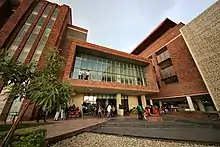
Ashoka University has a number of international institutional collaborations with global university partners including UPenn, UMich, Yale, Duke, King's College London, HEC Paris, Sciences Po and many others.[92] Faculty exchange, student exchange, and plans for collaborative programmes with international partners are a recognition of Ashoka's position.[93][94]
The university has accelerated its growth story and has signed MoUs with leading institutions around the globe. The University of Cambridge and Ashoka University have signed a Memorandum of Understanding in recognition of their mutual interest in promoting and furthering academic links between the two institutions.[95] The Office of Global Education and Strategic Programmes (GESP) at Ashoka University signed a MoU with National University of Singapore (NUS) in January 2022.[96][97]
Ashoka University has also joined a consortium of five Indian Institutes of Technology (IIT Delhi, IIT Kanpur, IIT Bombay, IIT Jodhpur and IIT BHU, Varanasi) to sign a Memorandum of Understanding (MoU) with University at Buffalo, The State University of New York.[98][99] The objective of this partnership is to establish a multiparty collaborative framework for long-term multi-institutional and international collaboration in educational and research fields. The research focus will be nanomaterials and nanotechnology, biotechnology, advanced sensors, photonics and cyber-physical systems including artificial intelligence. Ashoka University has further entered into a MoU with Max Healthcare Institute to initiate long-term, high-quality research collaborations.[100] The collaboration aims to build a joint research program on genome analysis and data analysis that will include AI, ML and deep learning of various genetic and life-style diseases.[101]
Notable academics
Arts and Humanities
- Urvashi Butalia – feminist writer and publisher
- Amit Chaudhuri – novelist
- Navtej Johar – dancer, choreographer and yoga exponent
- Rita Kothari – author and translator
- Clancy Martin – philosopher
- Saikat Majumdar – novelist
- Janice Pariat – poet and writer
- Sumana Roy – poet and writer
Social science
- Pulapre Balakrishnan – economist
- Amita Baviskar – environmental sociologist
- Nayan Chanda – political scientist
- Ashwini Deshpande – economist
- Gopalkrishna Gandhi – politician; historian
- Sunil Khilnani – political scientist
- Nayanjot Lahiri – historian
- Srinath Raghavan – historian
- Upinder Singh – historian
- Aparna Vaidik – historian
Science
- Anurag Agrawal – medical scientist, pulmonologist[102]
- Rajendra Bhatia – mathematician
- Alok Bhattacharya – parasitologist
- Sudha Bhattacharya – parasitologist
- Sourav Pal – theoretical chemist
- L. S. Shashidhara – developmental biologist, geneticist
Controversies
In October 2016, a faculty member, Rajendran Narayanan, and two other employees resigned; it was alleged by the Faculty Council that they were asked to resign because they signed a petition on Kashmir, something the university denies.[103] Narayanan believes he was targeted because he was also organising a Workers' Welfare Committee for all campus staff.[104]
In March 2021, two faculty members, Pratap Bhanu Mehta (formerly the VC of the university) and Arvind Subramanian, resigned within days of each other, alleging a curbing of academic freedom in the university.[105] Mehta has been an open advocate of liberalism, speaking openly about the 'Death of liberalism' under the Narendra Modi Government.[106] He resigned from Ashoka University in March 2021, when trustees Pramath Raj Sinha and Ashish Dhawan are said to have told him that his "intellectual interventions were something they could no longer protect."[107] This was followed by protests from students and faculty, who alleged that Mehta's views on the Modi administration might have drawn pressure internally, leading him to resign.[108] But the Vice Chancellor denied that[105]
Sabyasachi Das And His Controversial Paper (2023)
In August 2023, Assistant Professor Sabyasachi Das of the university's Economics Department resigned following the university's decision to formally announce that it was distancing itself from a controversial paper by Das. His resignation was accepted after making extensive efforts to dissuade him.[109]
Ashoka University's Vice Chancellor, Somak Raychaudhury, was cited by The Times of India stating that the research by Professor Das was perceived as reflecting the university's official stance. Raychaudhury clarified that the paper had not undergone a complete critical review process and had not been published in any accredited academic journal.[110] As reported by The Free Press Journal, the VC elucidated that Ashoka University grants its faculty members the autonomy to engage in teaching and research within their fields of interest. It was pointed out that while the university does not directly oversee or moderate the research pursuits of its faculty and students, this ethos of academic freedom was extended to Professor Das as well. The Vice Chancellor underscored that Ashoka University's rise in less than a decade is attributed to its unwavering dedication to both research and pedagogical excellence.[111] [112]
Following his resignation, his colleague in the Economics Department, Professor Pulapre Balakrishnan, also resigned. The Economics Department and the Political Science Department came out with formal statements expressing their support for Das. These departments demanded that Das be reinstated.[113]
According to a report from NDTV, Professor Balakrishnan conveyed in a letter addressed to Ashoka University's Chancellor, Rudrangshu Mukherjee, and the Chairperson of the Board of Trustees, Pramath Raj Sinha, that the university had never imposed any form of constraint on his classroom discussions, media writings, or public advocacy for rights. He further explained that his resignation was prompted by what he perceived as a significant lapse in judgment in the handling of the attention garnered by the controversial paper on social media. Professor Balakrishnan highlighted his experience of unbridled intellectual freedom during his eight-year tenure at the university, where he openly expressed his opinions in class, participated in street demonstrations, and contributed to media discussions without encountering any restrictions. He pointed out that Ashoka University had generously funded his latest book project, obviating the need for formal proposals or meetings. He disclosed that the publisher promptly approved the project upon its proposal and that the resultant study, a comprehensive examination of the nation's economic history, was a culmination of his professional journey, including a candid analysis of the present scenario. In the letter, Professor Balakrishnan conveyed his gratitude for the opportunities that the University provided to him. As a gesture of appreciation, he even offered his personal collection of books to augment the university's library.[114]
The Departments of English and Creative Writing called for Das' reinstatement.[115] The Department of Sociology and Anthropology also expressed solidarity with Das.[116]
See also
References
- "Association of Commonwealth Universities Membars-Asia". Retrieved 16 January 2019.
- "MyHealthcare partners with Ashoka University for evidence-based clinical research".
- Umarji, Vinay (20 June 2022). "Ashoka University launches long-term study on zoonotic disease outbreaks". Business Standard India.
- Karia, Shubhangi. "Ashoka University celebrates Founders' Day". Ashoka University. Archived from the original on 22 April 2019. Retrieved 21 December 2021.
- Gera, Ishaan (27 January 2020). "Ashoka University takes its Project Nobel ahead with donation for Centre of Biosciences". The Financial Express. Retrieved 26 February 2020.
- Nair, Deepa (7 April 2014). "Ashoka, India's first liberal arts university, to open in August". The Hindu Business Line.
- Sengupta, Devina (15 April 2014). "Dilip Shanghvi, Nirmal Jain, others line up to back Ashoka University". Economic Times. Retrieved 27 April 2018.
- "Ashoka University". Ashoka University. Archived from the original on 29 June 2014. Retrieved 7 August 2014.
- Goyal, Malini (11 May 2014). "Ashoka University: India's answer to the Ivy League, promises 'world-class' liberal arts education". Economic Times.
- "47% of Graduates of 2013 Unemployable for Any Job: Study". The New Indian Express. Retrieved 26 December 2013.
- Khosla, Varuni (8 March 2016). "Ashoka University, Michigan University partner to set up Ashok Trivedi Centre for Political Data". The Economic Times. Retrieved 28 June 2018.
- "Ashoka University appoints Dr Shahid Jameel as Director of Trivedi School of Biosciences". Express Pharma. 10 August 2020. Retrieved 3 January 2022.
- Goyal, Malini (11 May 2014). "Ashoka University: India's answer to the Ivy League, promises 'world-class' liberal arts education". The Economic Times. Retrieved 26 February 2020.
- "Ashoka University". Perkins Eastman. Retrieved 27 December 2018.
- "Ashoka University to build new campus, double student capacity". The Indian Express. 9 September 2021. Retrieved 3 January 2022.
- Kazmin, Amy (8 March 2018). "Ivy League, Indian-style". Financial Times. Retrieved 24 July 2018.
- "Ashoka University". Ashoka University. Archived from the original on 28 June 2014. Retrieved 2 March 2014.
- Puri, Anjali (27 December 2014). "I haven't lost faith in democracy. It is here to stay...: Andre Beteille". Business Standard India. Retrieved 15 September 2021.
- "Academic Bhanu Prasad Mehta appointed Ashoka University's next vice chancellor". InUth. 4 May 2017. Retrieved 3 January 2022.
- Nanda, Prashant K. (4 May 2017). "Pratap Bhanu Mehta to leave CPR, join Ashoka University as vice chancellor". Mint. Retrieved 3 January 2022.
- "Pratap Bhanu Mehta resigns as Ashoka University VC, former Presidency VC Malabika Sarkar to replace him". India Today. 22 July 2019. Retrieved 27 November 2021.
- Basu, Sreeradha. "Professor Somak Raychaudhury appointed Vice-Chancellor of Ashoka University". The Economic Times. Retrieved 1 January 2023.
- "Academics at Ashoka University". 31 March 2023.
- "Students below 28 years can apply for Ashoka University Young India Fellowship 2022-23". 26 February 2022.
- "Young India Fellowship" (PDF). Ashoka University. Retrieved 30 June 2019.
- "Young India Fellowship". Ashoka University. Retrieved 7 August 2014.
- "Young India Fellowship" (PDF). Ashoka University. Retrieved 30 June 2019.
- "Young India Fellowship". Ashoka University. Retrieved 7 August 2014.
- "Admissions open for postgraduate programmes at Ashoka University".
- "Graduate Admissions". Ashoka University. Retrieved 11 April 2022.
- "Ph.D." Ashoka University. Retrieved 11 April 2022.
- "Haryana govt ropes in young to boost good governance in state". The Asian age.
- "Haryana Chief Minister inducts sixth cohort of CMGGA". The Statesman.
- "Ashoka University". Ashoka University website. Retrieved 24 July 2018.
- "India Global Higher Education Alliance". College Board. Retrieved 24 July 2018.
- "Ashoka University". QS World University Ranking 2022. Retrieved 7 April 2022.
- "QS Asia University Rankings 2022". QS World University Ranking 2022. Retrieved 8 April 2022.
- "QS Asia University Rankings 2022: Ashoka University ranked first in 'International Faculty' across all 118 Indian varsities".
- "Department of Economics". Ashoka university. Retrieved 13 June 2022.
- "Ashoka University's Economics Department ranked no. 1". The Statesman. 15 October 2020. Retrieved 13 June 2022.
- "QS Asia University Rankings 2022". QS World University Ranking 2022. Retrieved 8 April 2022.
- "Main Page". Ashoka University. Retrieved 3 January 2022. Click on "Centres".
- "Ashoka Centre For Translation". Retrieved 21 July 2022.
- Scroll Staff. "Arunava Sinha wins Distinguished Translator Award 2022 at Jaipur Literature Festival". Scroll.in. Retrieved 21 July 2022.
- "About the ACWB". Asoka Centre for Well-Being. Retrieved 8 April 2022.
- "Art installation on mental health awareness in Delhi". Hindustan Times. 4 February 2020. Retrieved 21 July 2022.
- "About KCDH-A". Koita Centre for Digital Health at Ashoka. Retrieved 25 September 2023.
- "Ashoka University signs MoU with Koita Foundation to establish KCDH-A". Express Healthcare. 10 August 2023. Retrieved 25 September 2023.
- "Centre for Climate Change and Sustainability". Centre for Climate Change and Sustainability. Retrieved 8 April 2022.
- "Gautam I Menon | The Institute of Mathematical Sciences". www.imsc.res.in. Retrieved 21 July 2022.
- Umarji, Vinay (20 June 2022). "Ashoka University launches long-term study on zoonotic disease outbreaks". Business Standard India. Retrieved 21 July 2022.
- "3CS Fellowship for climate change reporting: Applications are open". The News Minute. 12 March 2022. Retrieved 21 July 2022.
- "Home". CEDA. Retrieved 21 July 2022.
- Venkataramakrishnan, Rohan. "Interview: Ashwini Deshpande on the need for Indian economists to grapple with discrimination". Scroll.in. Retrieved 21 July 2022.
- Dhawan, Himanshi (6 February 2022). "Why women in Punjab, Haryana are living longer than those in Andhra, Karnataka". The Times of India. Retrieved 21 July 2022.
- "Ashoka University develops Daily Food Price Index to track food inflation". Business Standard India. Press Trust of India. 2 June 2022. Retrieved 21 July 2022.
- "Data Portal Landing Page". CEDA. Retrieved 21 July 2022.
- Bhardwaj, Ankur (28 February 2022). "India saw a 30% decrease in jobs for young people since 2016. Here's why". ThePrint. Retrieved 21 July 2022.
- "Centre for Entrepreneurship Team". Ashoka University. Retrieved 8 April 2022.
- "Ashoka Pillar Award given to young talent for their solutions to tackle the worsening air quality". The Statesman. 20 September 2018. Retrieved 21 July 2022.
- "Centre for Interdisciplinary Archaeological Research". Ashoka University. Retrieved 8 April 2022.
- "Dr. Kritika Garg – Institute of Bioinformatics and Applied Biotechnology". Retrieved 21 July 2022.
- "Ashoka University: Leading Liberal Arts and Sciences University". www.ashoka.edu.in. Retrieved 21 July 2022.
- "Ashoka University: Leading Liberal Arts and Sciences University". www.ashoka.edu.in. Retrieved 21 July 2022.
- "Centre for Social and Behaviour Change". Centre for Social and Behaviour Change. Retrieved 8 April 2022.
- ANI (26 June 2020). "Niti Aayog launches behaviour change campaign 'navigating the new normal'". Business Standard India. Retrieved 21 July 2022.
- "State Behavioural Insights Units, Centre for Social and Behaviour Change". Centre for Social and Behaviour Change. Retrieved 9 September 2022.
- "About CSIP". Centre for Social Impact and Philanthropy. Retrieved 8 April 2022.
- "Apart from Azim Premji, nobody is really giving till it hurts, says Ingrid Srinath". cnbctv18.com. 21 November 2019. Retrieved 21 July 2022.
- Bureau, BL New Delhi (25 December 2021). "Re-examination of tax incentives to encourage philanthropy urgently required: CSIP Director". www.thehindubusinessline.com. Retrieved 21 July 2022.
- "A study pitches for reintroduction of wealth tax to address inequality". The Economic Times. Retrieved 21 July 2022.
- manku, Moyna (18 November 2016). "A fellowship that helps create agents of change". mint. Retrieved 21 July 2022.
- An, Shelly. "The Mother Teresa Fellowship is for those who possess the willpower and intent to create an impact in the development sector". India Today. Retrieved 21 July 2022.
- "Sex/Ed". Centre for Studies in Gender and Sexuality. Retrieved 8 April 2022.
- "Madhavi Menon Wants Us To Embrace Ambiguity | Verve Magazine". www.vervemagazine.in. 17 March 2022. Retrieved 21 July 2022.
- "'We Have Rich Histories of Desire in India': An Interview With Madhavi Menon". The Wire. Retrieved 21 July 2022.
- Bahuguna, Urvashi. "Interview: 'Desire is never straightforward. In fact, there is nothing straight about desire at all'". Scroll.in. Retrieved 21 July 2022.
- "Ashoka University organises CSGS Mehfil on 6th anniversary, talks about queer representation in India over the years". The New Indian Express. Retrieved 21 July 2022.
- "Centre for Writing and Communication". Ashoka University. Retrieved 8 April 2022.
- "Walking around Delhi sites that tell the story of 1857". The Indian Express. 15 November 2016. Retrieved 21 July 2022.
- Kanungo, Neerav Dwivedi,Uday. "From Mahasweta Devi's Draupadi to James Joyce's Ulysses: How the censors misread literature". Newslaundry. Retrieved 21 July 2022.
{{cite web}}: CS1 maint: multiple names: authors list (link) - "Ashoka University: Leading Liberal Arts and Sciences University". www.ashoka.edu.in. Retrieved 16 November 2022.
- "Science Policy Initiative". Ashoka University. Retrieved 8 April 2022.
- "Focus on policies to encourage made in India drugs against rare diseases". Hindustan Times. 9 March 2022. Retrieved 21 July 2022.
- "Ashoka University: Leading Liberal Arts and Sciences University". www.ashoka.edu.in. Retrieved 21 July 2022.
- "Strengthening Supply-Chain Networks during a pandemic: A Consortia-driven Approach is the right policy for India". The Indian Express. 15 May 2020. Retrieved 21 July 2022.
- "Trivedi Centre for Political Data". Ashoka University. Retrieved 8 April 2022.
- "Gilles Verniers". India Today. Retrieved 21 July 2022.
- "Gilles Verniers Blog". Times of India Blog. Retrieved 21 July 2022.
- "Gilles Verniers | Scroll.in". Gilles Verniers. Retrieved 21 July 2022.
- Hangal, Gilles Verniers & Sudheendra. "Opinion: It's futile to blame political parties for using data manipulators like Cambridge Analytica". Scroll.in. Retrieved 21 July 2022.
- "Ashoka University: Leading Liberal Arts and Sciences University".
- "Ashoka University: Leading Liberal Arts and Sciences University".
- "Ashoka University: Leading Liberal Arts and Sciences University".
- "Ashoka University signs MoU with University of Cambridge". 18 December 2021.
- "Ashoka University and National University of Singapore (NUS) sign MoU to promote academic and research collaboration". 10 March 2022.
- "News from world of education: March 15, 2022". The Hindu. 15 March 2022.
- "UB, Indian universities sign historic MOU during nanomaterials workshop".
- "News from the world of education: May 24, 2022". The Hindu. 24 May 2022.
- "Ashoka University, Max Healthcare sign MoU to study complex diseases. Read here". 10 May 2022.
- "Ashoka University, Max hospital sign MoU".
- "Ashoka University appoints Dr. Anurag Agrawal, Former Director CSIR IGIB, as Dean of Biosciences and Health Research". Ashoka University. Retrieved 14 June 2022.
- Chopra, Ritika (1 March 2017). "Firing of professor will hurt Ashoka, says university faculty body as three staff exit over Kashmir petition". Indian Express. Retrieved 25 March 2021.
- Narayanan, Rajendran (24 March 2021). "Dismantling the labyrinth: What I learnt about power and privilege when I quit Ashoka in 2016". Scroll. Retrieved 25 March 2021.
- "Arvind Subramanian resigns from Ashoka University after P.B. Mehta's exit". The Hindu. 18 March 2021. Retrieved 18 March 2021.
- Singh, Nandita (9 July 2019). "5 reasons why 'liberalism is dead' according to Pratap Bhanu Mehta". ThePrint. Retrieved 9 July 2019.
- Chopra, Ritika (19 March 2021). "Founders made clear I was political liability for Ashoka University: Pratap Bhanu Mehta". Indian Express. Retrieved 19 March 2021.
- Chowdhury, Archis (18 March 2021). "Bhanu Pratap Mehta's Exit Upsets Ashoka University Students & Faculty". Boom. Retrieved 18 March 2021.
- Vincent, Pheroze L. (17 August 2023). "Ashoka University faculty sets two conditions before carrying forward teaching obligations". The Telegraph (India). Retrieved 18 August 2023.
- "Amid row, Ashoka University clears air on prof's resignation". timesofindia.indiatimes.com. The Times of India. 19 August 2023. Retrieved 19 August 2023.
- "Author of 'Democratic backsliding' paper quits Ashoka University". thehindu.com. The Hindu. 15 August 2023. Retrieved 18 August 2023.
- "Ashoka University Resignation row". freepressjournal.in. The Free Press Journal. 19 August 2023. Retrieved 19 August 2023.
- "Ashoka University political science department extends solidarity to ex-professors". hindustantimes.com. The Hindustan Times. 17 August 2023. Retrieved 18 August 2023.
- "University Didn't Place Slightest Restraint: 2nd Ashoka Professor Who Quit Over Research Paper". ndtv.com. NDTV. 19 August 2023. Retrieved 19 August 2023.
- "Three Ashoka University departments seek professor's reinstatement, threaten to stop work". scroll.in. Scroll India. 16 August 2023. Retrieved 18 August 2023.
- "The official statement from my department on the current @AshokaUniv crisis". twitter.com. X. 16 August 2023. Retrieved 18 August 2023.
